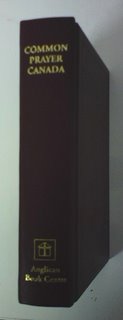A Rule of Life
Last weekend while in Victoria, BC, I visited an Anglican Church and heard a Sermon on "Commitment". The parishioners were being exhorted to adhere to the following "Rule" from the Book of Common Prayer of the Anglican Church of Canada (1962 edition):
 "Every Christian man or woman should from time to time frame for himself a RULE OF LIFE in accordance with the precepts of the Gospel and the faith and order of the Church; wherein he may consider the following:
"Every Christian man or woman should from time to time frame for himself a RULE OF LIFE in accordance with the precepts of the Gospel and the faith and order of the Church; wherein he may consider the following:
-The regularity of his attendance at public worship and especially at the Holy Communion.
-The practice of private prayer, Bible-reading, and self-discipline.
-Bringing the teaching and example of Christ into his everyday life.
-The boldness of his spoken witness to his faith in Christ.
-His personal service to the Church and the community.
-The offering of money according to his means for the support of the work of the Church at home and overseas."
Last weekend while in Victoria, BC, I visited an Anglican Church and heard a Sermon on "Commitment". The parishioners were being exhorted to adhere to the following "Rule" from the Book of Common Prayer of the Anglican Church of Canada (1962 edition):
 "Every Christian man or woman should from time to time frame for himself a RULE OF LIFE in accordance with the precepts of the Gospel and the faith and order of the Church; wherein he may consider the following:
"Every Christian man or woman should from time to time frame for himself a RULE OF LIFE in accordance with the precepts of the Gospel and the faith and order of the Church; wherein he may consider the following:-The regularity of his attendance at public worship and especially at the Holy Communion.
-The practice of private prayer, Bible-reading, and self-discipline.
-Bringing the teaching and example of Christ into his everyday life.
-The boldness of his spoken witness to his faith in Christ.
-His personal service to the Church and the community.
-The offering of money according to his means for the support of the work of the Church at home and overseas."



